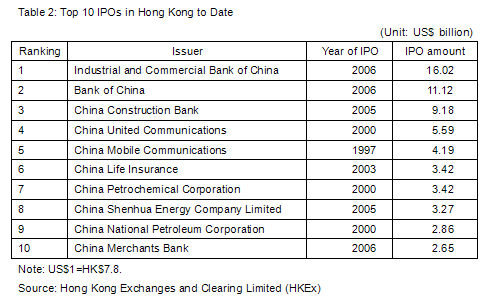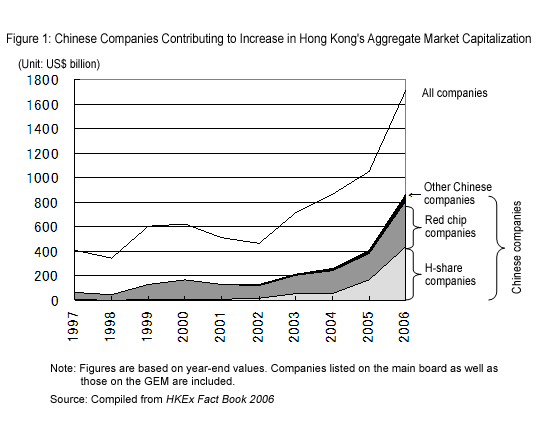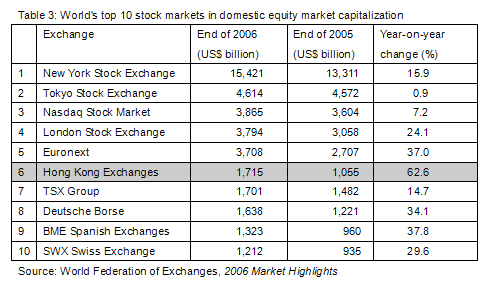In recent years, many Chinese companies have been seeking to list overseas. In addition to raising capital to fund further investments, they have three underlying objectives: 1) improve corporate image in the international market and expand marketing channels, 2) establish an effective corporate governance structure under strict supervision and management imposed by overseas securities markets thereby increasing competitiveness, and 3) learn management expertise, both directly and indirectly, from overseas companies. Major securities markets around the world are responding to these needs by increasing efforts to attract Chinese companies. However, Hong Kong appears to have a clear advantage in this competition, as signified by the listing of one major bank after another on the Hong Kong's stock exchange (HKEx).
Hong Kong is taking advantage of its proximity to mainland China in serving as a base for a number of institutional investors focusing on mainland Chinese companies. It is also blessed with a large pool of people who know and understand China and its language. Hong Kong far exceeds other markets both in terms of the number and size of mainland Chinese companies listed, resulting in high market liquidity and active trading in Chinese stocks. Also, as an international financial center where no capital controls exist and neither interest withholding tax nor capital gains tax are imposed, Hong Kong attracts funds from around the world; an extremely appealing characteristic to mainland Chinese companies.
Chinese companies listed on the HKEx can be categorized into three types: "H-share companies" incorporated in mainland China and controlled by Chinese government agencies or individuals, "red chip companies" incorporated overseas and controlled by Chinese government agencies, and "non-H-share mainland private enterprises" incorporated overseas and controlled by Chinese individuals. As of the end of 2006, a total of 367 Chinese companies (141 H-share, 90 red chip, and 136 non-H-share) are listed on the Hong Kong Stock Exchange. The figures include not only those listed on the Main Board, the main market of the HKEx, but also those on the Growth Enterprise Market (GEM) created in 1999 to provide startups with a means of raising capital. (The GEM, however, remains small with the market capitalization of listed shares representing less than 1% of that of the Main Board.)
Equity capital raised through the HKEx in 2006 totaled US$67.4 billion, of which US$42.9 billion was in initial public offerings (IPOs) and US$24.5 billion through the issuance of additional shares. This makes Hong Kong the third largest stock market in the world behind New York (US$103.2 billion) and London (US$95.2 billion) in terms of the amount of equity capital raised and, in terms of the amount of capital raised in IPOs, Hong Kong exceeds New York and is second only to London (table 1). Chinese companies, the key players behind Hong Kong's high marks, account for some 70% of the total equity capital raised in the market. Since July 1993, when Tsingtao Brewery Co. became the first Chinese company to list on the HKEx, a cumulative total of US$188.6 billion has been raised in equity capital by Chinese companies in the market as of the end of 2006.
Indeed, the top 10 IPOs (in terms of size of capital raised) in Hong Kong to date all come from mainland China. Among them are high-profile, internationally large-scale IPOs such as the Industrial and Commercial Bank of China (ICBC) in October 2006, Bank of China in June 2006, and China Construction Bank in October 2005 (table 2). In particular, the ICBC's simultaneous listing as an H-share company in Hong Kong and an A-share company in Shanghai, raised a total of US$21.9 billion (US$16 billion in Hong Kong and US$5.9 billion in Shanghai), making it the world's largest IPO to that date, breaking the previous record of US$18.1 billion set by Japan's NTT DoCoMo in 1998.


The Hong Kong stock market is growing rapidly on the increasing volume of shares issued in the market in the form of IPOs primarily by mainland Chinese companies and through add-on offerings by listed companies, and bolstered by the sharp rise in stock prices with the Hang Seng index at the end of 2006 posting a 34.2% rise year on year (figure 1). The market capitalization of shares listed in Hong Kong stood at US$1,715 billion as of the end of 2006, up 62.6% from 2005, and Chinese companies account for roughly half of that amount. Consequently, Hong Kong became the world's sixth largest stock market, surpassing Germany and Toronto (table 3). It will not be long before the Hong Kong stock market, which got on China's express train of development, grows to a size comparable to those of New York, Tokyo, and London.




